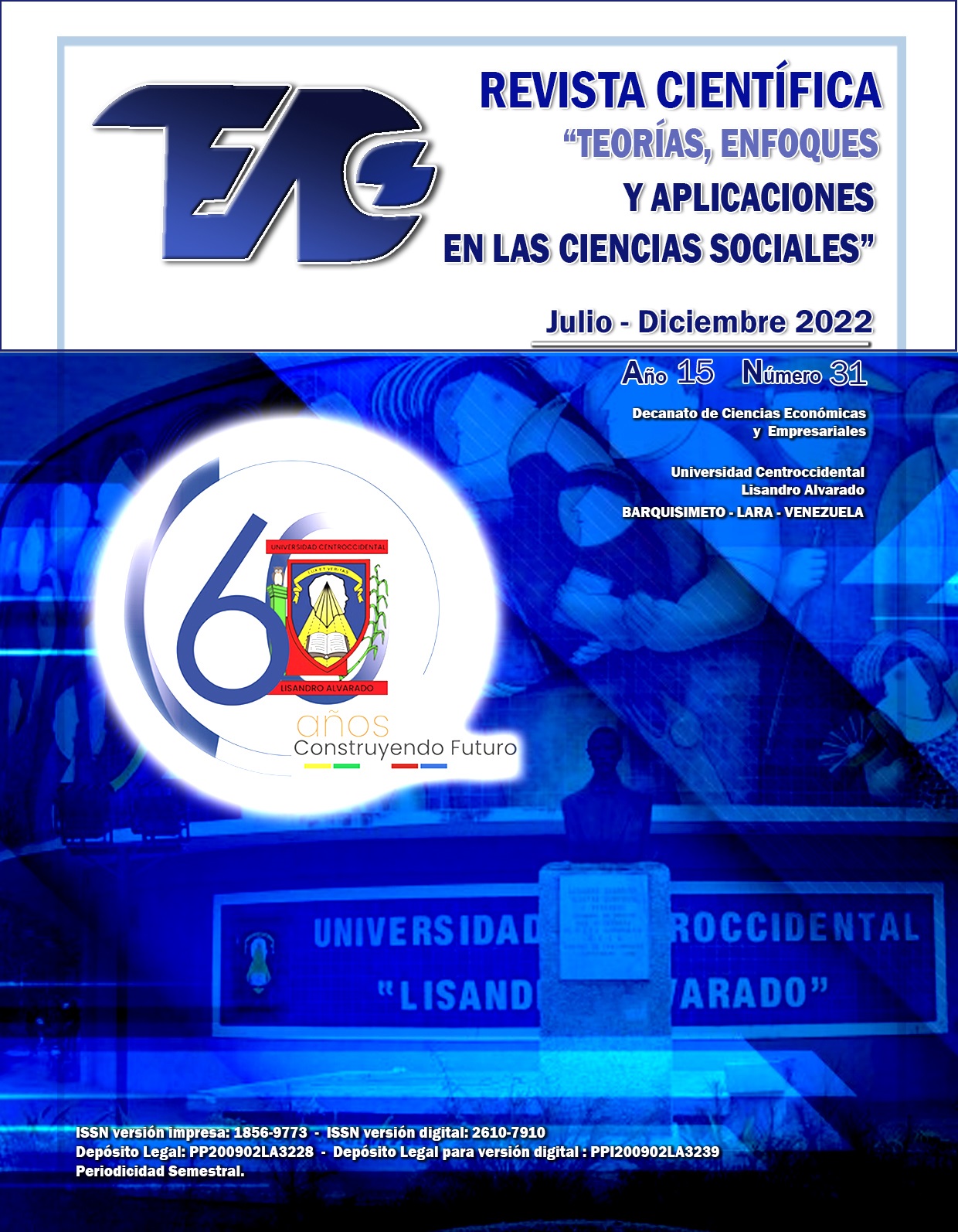The Virtual education, management and relationship with the theory of resource dependence (tor)
Keywords:
virtual education, management, resource dependency theoryAbstract
The objective of this research work, of a theoretical-descriptive nature, is to carry out a review of the literature on virtual education, management and the applications of the Resource Dependency Theory. The analysis was carried out based on previous works. Some considerations on the relationship of virtual education with the resource dependency theory (TDR) are also presented, in addition, a synthesis is included that shows the importance of its theoretical postulates in the organizational field. The findings of the work allow us to affirm that the management of virtual education requires the support of the environment, since they are not self-sufficient to generate all the resources and services they require, which leads them to participate in exchanges and transactions with other organizations. The research provides elements that facilitate the understanding of the application of the resource dependency theory in the field of virtual education management, which are relevant to the development of virtual education as it is to take advantage of the resources offered by the setting.
Downloads
References
Alba, C., Sánchez, J., & Zubillaga, A. (2015). Tecnologías y diseño universal para el aprendizaje (DUA): Experiencias en el contexto universitario e implicaciones en la formación del profesorado. RELATEC: Revista Latinoamericana de Tecnología educativa, 14(1), 89-100
Arik, M. (2016). Strategic responses of non-profit organizations to the economic crisis: Examining through the lenses of resource dependency and resourced-based view theories. Academy of Strategic Management Journal, 15.
Cassidy, S. (2016). Virtual learning environments as mediating factors in student satisfaction with teaching and learning in higher education. Journal of Curriculum and Teaching, 5(1), 113-123.disponbile: doi:https://doi.org/10.5430/jct.v5n1p113.
Condori, L. B. (2018). Factores asociados al uso de las tecnologías de información y comunicación en los docentes de Instituto de Educación Superior Tecnológico Público "Manuel Núñez Butrón" de Juliaca, 2017. (Tesis de grado obtenido no publicada). Universidad Católica de Santa María, Arequipa, Perú.
Díaz, D. (2013). TIC en Educación Superior: Ventajas y desventajas. Educación y Tecnología
Facundo, A. (2004). Tecnologías de Información y Comunicación y Educación Superior Virtual en Latinoamérica y el Caribe. UNESCO/IESALC.
García-Peñalvo, F., & Seoane-Pardo, A. (2015). Una revisión actualizada del concepto de eLearning. Décimo Aniversario. Education in the Knowledge Society, 16(1), 119-144. doi:https://doi.org/10.14201/eks2015161119144
González P., J., (2001). Hacia una reforma educativa en la era digital. [Documento en línea]. Disponible: http://rieoei.org/rie26a04. Html. [Consulta: septiembre 15, 2021].
Gómez, A., & Calvo, J. L. (2011). INNOVACIÓN: Factor Clave del Éxito Empresarial. Bogotá., Colombia: ECOE Ediciones.
Hernández, L., Acevedo, J., Martínez, C., & Cruz, B. (2014). El uso de las TIC en el aula: un análisis en términos de efectividad y eficacia. Presentado en Congreso Iberoamericano de Ciencia, Tecnología, Innovación y Educación, Buenos Aires.
Hitt, M.; Xu, K., & Matz, C. (2016). Resource based theory in operations management research. Journal of Operations Management. 41.
Klein, L. & Diniz, B. (2016). The survival of interorganizational networks: A proposal based on resource dpendence theory. RAM. Revista de Administração Mackenzie, 17(4).
Klijn, E., Sierra, V., Ysa, T., Berman, E., & Edelenbos, J. (2016). The influence of trust on network performance in Taiwan, Spain, and the Netherlands: a cross- country comparison. International
Mangiatordi, A., & Serenelli, F. (2013). Universal design for learning: A meta- analytic review of 80 abstracts from peer reviewed journals.REM–Research on Education and Media, 5(1), 109-118.
Morales, J., Fernández, K., & Pulido, J. (2016). Evaluación de técnicas de producción accesible en cursos masivos, abiertos y en línea-MOOC. Revista CINTEX, 21(1), 89-112.
Mora, D. (2010) La gerencia en la educación virtual: aproximación teórica Fenomenológica desde la perspectiva de los estilos gerenciales en las universidades privadas venezolanas. Disponbile en: www.ucv.ve › documentos › Evento › Ponencias_3 › Mora__Doris.
Osorio N. (1997). La formación de profesionales en Venezuela hacia el siglo XXI. Revista venezolana de Ciencias Sociales. Volumen 1, numero 1. Universidad Nacional Experimental José María Baralt Cabimas estado Zulia Venezuela
Pfeffer, J. & Salancik, G. (1978). The external control of organizations: A resource dependence perspective. United States of America: Harper&Row, Publishers.
Rueda & Zapata, G. (2018), Teoría de la Dependencia de los Recursos. Premisas y Aplicaciones. Revista Ciencia y Sociedad. Volumen 43. Número 1.
Silvio, J. (2003). Tendencias de la educación superior virtual en América Latina y El Caribe. En RAMA, C.(Ed.). La educación superior virtual en América Latina y El Caribe. Recuperado el 2 de octubre de 2012, disponible: http://www.iesalc.unesco.org.ve/dmdocuments/biblioteca/libros/EducVirtual_ALC.pdf
Temesio, S. (2016). Educación inclusiva: Retos y oportunidades. Revista de Educación a Distancia, (51). Doi: https://doi.org/10.6018/red/51/9
UNESCO (2008). La educación encierra un tesoro, Informe a la UNESCO de la Comisión Internacional sobre la educación para él siglo XXI. Madrid, Santillana/Unesco.
Vidal, M., Gavilondo, M., Rodríguez, A., & Cuéllar, A. (2015). Aprendizaje móvil. Educación Médica Superior.
Velasco, C. (2018). Gerencia de entornos virtuales de aprendizaje en la gestión docente universitaria. Eco matemático. Volumen 9. Enero - Junio de 2018. Disponible: https://revistas.ufps.edu.co› index.php › article › vie. Consulta: 20/septiembre/21
Zapata, G. & Mirabal, A. (2011). El cambio en la organización: un estudio teórico desde la perspectiva de control externo. Estudios Gerenciales, 27 (119).
Zapata, G. & Hernández, A. (2014). La empresa: diseño, estructuras y formas organizativas. Segunda edición ampliada. Barquisimeto: Fondo Editorial UCLA.
Published
How to Cite
Issue
Section

This work is licensed under a Creative Commons Attribution-NonCommercial-ShareAlike 4.0 International License.
Derechos del/de autor/es a partir del año de publicación
Esta obra está bajo la licencia:
Creative Commons Reconocimiento-NoComercial-CompartirIgual 4.0 Internacional (CC BY-NC-SA 4.0)
Las opiniones expresadas por los autores no necesariamente reflejan la postura del editor de la publicación ni de la UCLA. Se autoriza la reproducción total o parcial de los textos aquí publicados, siempre y cuando se cite la fuente completa y la dirección electrónica de esta revista. Los autores(as) tienen el derecho de utilizar sus artículos para cualquier propósito siempre y cuando se realice sin fines de lucro. Los autores(as) pueden publicar en internet o cualquier otro medio la versión final aprobada de su trabajo, luego que esta ha sido publicada en esta revista.



